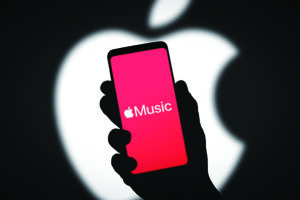노먼레브레히트 칼럼 | SINCE 2012
영국의 평론가가 보내온 세계 음악계 동향
미래에서 도착한 사운드
스트리밍 서비스의 약진을 바라보는 비평가의 시선
 애플 뮤직 클래식(Apple Music Classical)이 우리 삶을 변화시킬지는 지켜봐야 알겠지만, 활발한 일부 시범을 기반 삼아 확신하겠다. 지난 3월 공개된 이 애플리케이션(현재 한국 미지원)은 적어도 이 못마땅한 선진국에게 구원이 될 것이다.
애플 뮤직 클래식(Apple Music Classical)이 우리 삶을 변화시킬지는 지켜봐야 알겠지만, 활발한 일부 시범을 기반 삼아 확신하겠다. 지난 3월 공개된 이 애플리케이션(현재 한국 미지원)은 적어도 이 못마땅한 선진국에게 구원이 될 것이다.
언제든 현존하는 그 어떤 클래식 음악이 필요할 때, 이 애플리케이션은 바로 답을 준다. 애플사는 2만여 명의 작곡가가 쓴 11만 5,000여 개 작품의 모든 연주를 제공하고 있으니 말이다. 연주자를 검색하면 곧바로 결과가 뜬다. 이름이 보이지 않는다면 다음 주에 다시 시도해보자. 데이터베이스는 계속해서 확장되고 있다.
추정하건대 애플 뮤직 클래식은 공식 출시된 전 세계 클래식 음반의 8할 이상을 보유하고 있다. 접하기 힘든 러시아의 멜로디야(Melodiya)부터 클래식 음악계의 저렴한 스파(SPA) 브랜드인 낙소스(Naxos)까지 중요 자료는 모두 들어간 것으로 보인다. 이 애플리케이션의 불참자는 인터넷이 없는 세상을 바라며 여전히 오프라인에서만 음반을 발매하는 소수의 단독 레이블뿐이다. 그 저항자 중 하나였던 하이페리온(Hyperion)마저 최근 유니버설 뮤직(Universal Music)에 인수되어, 몇 주 내에 애플에서 스트리밍될 예정이다. 시대에 뒤처진 마차들이 차례로 증기기관차에 추월당하고 있으니, 이는 클래식 음악계의 탈공업화나 다름없다.
고품질과 편리의 공존
애플의 음향은 기대보다도 더 나아졌다. 애플은 네덜란드의 스트리밍 서비스 업체 ‘프라임포닉(Primephonic)’ 인수를 발판 삼아 돌비 애트모스(Dolby Atmos)의 성능을 높였고, 집에서도 최적의 장소처럼 청취가 가능한 발칙한 공간 음향(Spatial Audio)을 더한 애플리케이션을 만들어냈다. 이를 이용하면 청자가 악기의 위치도 이동시킬 수 있다고 하는데, 어떤 식으로 작동하는지는 아직 알아내지 못했다.
공간 음향과 돌비 애트모스의 듀오에서 더욱 놀라운 점을 설명해보자. 예를 들어, 리카르도 샤이/라 스칼라 오케스트라의 베르디 합창 음반을 들을 때, 음반을 그저 충실히 재생하는 게 아니라 합창단 각자의 음성이 구분돼서 들리는 투명성이 느껴진다. 처음 감상할 때는 꽤 충격적이었다. 베를린 필하모닉이 연주한 쇼스타코비치 교향곡 10번의 본질적인 명료함은 오케스트라에서 발매한 자체 레이블 음반보다도, 심지어 공연장에서 들었던 내 기억보다도, 애플 뮤직 클래식에서 더욱 뚜렷했다. 미래에서 온 음향 품질이 이런 느낌일까.
이는 애플이 목표하고 있는 바이기도 하다. 지난 백 년간의 음반을 흡수하는 것과 더불어 애플은 베를린 필하모닉·빈 필하모닉·뉴욕 필하모닉·로열 콘세르트헤바우 오케스트라 등의 주요 관현악단에서 지금까지 해당 악단의 구독자에게만 공개했던 매 시즌 최고의 공연을 애플 뮤직 클래식 애플리케이션에 공개했다. 이 거래로 애플은 생동하며 진화하는 예술에 참여하고 있다는 청자의 환상과 구독자를 함께 얻게 됐다.
영국 공영방송(BBC)·오스트리아 공영방송(ORF)과 같은 방송국과 잉글랜드 예술위원회(Arts Council England) 등 기금을 제공하던 기관이 오케스트라와 오페라로부터 총력을 기울여 퇴각하고 있는 2023년, 세계적인 대형 IT 기업이 클래식 음악을 주력 상품으로 들고 등장한 것이다. 애플 뮤직의 부회장 올리버 슈서(1972~)는 내게 이렇게 말했다. “애플은 오늘날의 이 순간을 향해 몹시 오랜 기간 달려왔습니다. 저희에게 진정으로 애정 어린 작업이었죠.” 모든 비즈니스 용어가 으레 그렇듯, 이들도 계획으로 가득 차 있다. 애플은 스포티파이(Spotify)·이다지오(Idagio)·코부즈(Qobuz) 같이 클래식 음반을 ‘트랙’으로 구분하는 전문 서비스의 파이를 제거할 셈이다.
이 서비스의 가장 큰 매력은 이미 아이폰으로 월 10.99달러를 지불하며 애플 뮤직을 구독하고 있다면, 이 신규 애플리케이션을 무료로 사용할 수 있다는 점이다. 안드로이드의 경우 곧 지원될 것 같으니, 문제점이라곤 전혀 없어 보인다.
품질을 저하하는 편리
물론 모든 검색이 광고처럼 쉽지는 않다. 하버갈 브라이언(1876~1972)의 교향곡(Naxos)과 겐나디 로즈데스트벤스키의 쇼스타코비치 모음(Melodiya)을 찾다가 서비스 센터에 전화해 도움을 요청해야 했지만, 이는 해결될 게 분명한 사소한 문제에 불과하다. 편집 노트는 살짝 정이 안 가고, 애플이 특별히 신경 써 그려 놓은 작곡가 초상화는 터무니없거나 끔찍하다. 쇼팽은 휴양지 제비족처럼, 라흐마니노프는 미 중서부 기업의 재무 담당자처럼 보인다. 음반 해설도 농담이 빠진 위키피디아 같다. 과거 클래식 음악 레이블은 사실적인 이미지와 전문가 평론으로 권위를 구축했으나, 이 신생 애플리케이션은 자신의 방식이 잘 먹히리라 생각한 모양이다.
나를 더욱 불편하게 만드는 점은 클래식 음악의 불가항력적인 물질만능주의로, 이는 비단 애플만이 아닌 업계 전반에 해당한다. 지직거리는 LP가 반짝이는 CD로 교체되는 것에 환호한 세대였던 나는 요즘 레코드판으로 장식된 방에 젊은 세대가 신혼집을 차리는 모습을 보면 놀랍기만 하다. 구매 확정을 위해 전화를 세 번이나 걸어야 했던 아마존의 초기 시기에도 온라인으로 책을 구매했던 나는 변화에 저항하는 사람도, 러다이트 운동가도, 백신 접종 거부자도 아니다. 하지만 내 손바닥만 한 기계에 클래식 음반 역사가 들어가는 모습은 문명에 대한 평가 절하로 느껴진다.
물론 록 밴드 프로콜 하럼(Procol Harum)의 ‘창백한 하얀 그림자(A Whiter Shade of Pale)’에 말러 교향곡 10번에 대한 단서가 있는지 확인하기 위해(당연히 없다) 무한한 선택지를 손에 쥐고 즉시 작품을 불러올 수 있다는 점은 놀랍다. 놀랍기는 하지만 너무 쉽다. 일이 이토록 쉬워지면 값어치를 잃기 마련이다. 내게 음반은 여전히 물건으로 인식된다. 실리콘 밸리의 IT 업계에서는 나 같은 사람을 화석 취급할 것이다. 그러나 음반을 단지 스트리밍 속을 떠다니는 부유물에 지나지 않는다고 보면, 음악과 우리의 관계에서 존재하는, 말하자면 막연한 애플 플레이리스트로는 복제될 수 없는 음악에 대한 일종의 소유 의식이 죽게 된다.
다른 이들과 마찬가지로 나도 남은 평생에 클래식 음악을 스트리밍으로 들을 테고, 임종의 순간에는 아이폰으로 미츠코 우치다의 베토벤 마지막 피아노 소나타의 아리에타를 들을지도 모른다. 그 순간이 온다면 후회는 가득할지언정, 다음 혁명을 목도하지 못함이 분명 아쉽지는 않을 것이다.
번역 evener
노먼 레브레히트 칼럼의 영어 원문을 함께 제공합니다
본 원고는 본지의 편집 방향과 일치하지 않을 수 있습니다
I have heard the future, and it works.
Whether Apple Classical Music will change our lives remains to be seen, but on the basis of some fairly vigorous testing I can assure you that the app, launched this month, is the solution to at least one first world problem.
If you happen to need the whole of classical music on tap, this is practically it. Apple delivers 115,000 works by twenty thousand composers in any number of interpretations. Search for a performer and a result pops up within a second. If the name is missing, come back next week. The database is being constantly enlarged.
By my estimation, Apple’s app has over eighty percent of all music ever recorded for public release. It seems to contain all significant sources, from elusive Russian Melodiyas to cut-price Naxos, the Primark of classical music. The only absentees are a scattering of lone-owner labels that kept their output offline in the hope the internet would go away. One such holdout, Hyperion, newly acquired by Universal Music, is about to be streamed on Apple within weeks. One by one, the slow horses are being outrun by the steam engine. For classical music, this amounts to its post-industrial revolution.
The sound on Apple is as good as it gets, actually better. Apple built its app onto the Dutch classical streaming service Primephonic, souping it up with Dolby Atmos and cheeky new Spatial Audio that is supposed to place you, the listener, in the best seat in the house. It is also meant to let you change seats, but I haven’t figured out yet how that works.
What struck me about the Spatial/Dolby combo is not so much the fidelity of, say, Riccardo Chailly’s La Scala album of Verdi choruses as a transparency that makes each human voice sound separately defined. It’s quite shocking on first hearing. In a Shostakovich tenth symphony from Berlin, the internal definition seemed to me clearer than the orchestra’s own-label recording and, weirdly, than my aural memory of hearing it in the hall. If this is the to be future quality of sound, bring it on.
And that’s where Apple is aiming. In addition to suctioning up a hundred years of past recordings, Apple has got the philharmonic orchestras of Berlin, Vienna and New York, the Concertgebouw of Amsterdam and a couple of other big noises to release each season’s best concerts on the app, events that were accessible until now only to the orchestras’ direct subscribers. The deal allows Apple to foster an illusion of renewal, of listener participation in a living, evolving art.
At a time when broadcasters like the BBC and ORF and funders like Arts Council England are in full retreat from orchestras and opera, one of the world’s biggest tech corporations has made classical music its flagship project of 2023. ‘We have been building towards this moment for a really long time,’ Oliver Schusser, Vice President of Apple Music, tells me, ‘it really has been a true labour of love for us.’ Like all corp-speak, this comes hedged with agendas. Apple wants to clear its lawn of Spotify, which issues classics as ‘tracks’, as well as such specialist services as Idagio and Qobuz.
The biggest draw is that the new app comes free, provided you take an Apple Music monthly subscription for £10.99 (UK) or $10.99 (US) and have an iPhone to play it on (I am assured that android phones will be given access before long). So where’s the drawback?
Not every search is as simple as advertised. I had to call a helpline to find Havergal Brian symphonies (Naxos) and the Gennady Rozhdestvensky Melodiya set of Shostakovich, but these are glitches that will doubtless be ironed out. Slightly more off-putting was the editorial wallpaper. Apple’s specially painted composer portraits are desultory to terrible – Chopin looks like a Marbella gigolo, Rachmaninov like a Midwestern CFO – and the liner notes read like Wikipedia without the jokes. Old-world classical labels built their authority on authentic images and expert essays. This newbie thinks it can do better.
My darker discomfort, though, is with the irresistible Californication of classical music, and not by Apple alone. I belong to a generation that cheered when scratchy LPs were supplanted by shiny CDs and now watches in amazement as newlyweds go nesting in rooms walled with vinyl discs. I first bought books online at Amazon when you had to phone up three times to finalise a purchase. I am not resistant to progress, not a Luddite, not an anti-vaxxer. But putting the whole of classical music onto a device that fits into the palm of my hand feels like a devaluation of civilisation.
Of course, it’s wonderful to have limitless choice and to summon a work instantly in order to verify whether there is a hint of Mahler’s tenth in Procol Harum’s A Whiter Shade of Pale (there isn’t). It’s terrific, but it’s too easy – and things that are made easy lose value. I still think of a record as an object. That may class me as a dinosaur in Silicon Valley terms but when a recording becomes no more than flotsam in a stream something dies in our relation to music, some sense of ownership that cannot be replicated by a nebulous Apple playlist.
I shall, like everyone else, be streaming classical music for the rest of my life and I may well have an Apple phone play Uchida’s Arietta from Beethoven’s last piano sonata as I breathe my last. If I do, though, it will be with a rattle of regret, and I shall certainly not be sorry to miss the next revolution.
 글 노먼 레브레히트
글 노먼 레브레히트
영국의 음악·문화 평론가이자 소설가. ‘텔레그래프’지, ‘스탠더즈’지 등 여러 매체에 기고해왔으며, 지금 이 순간에도 자신의 블로그(www.slippedisc.com)를 통해 음악계 뉴스를 발 빠르게 전한다







